Microsoft Visual C++ Redistributable: Why do I have so many installed?
If you’ve ever scrolled through your list of installed programs in Windows, you’ve probably noticed multiple versions of the Microsoft Visual C++ Redistributable. You’re not alone in wondering why they’re there and if they’re necessary. In this article, we’ll explain what the Visual C++ Redistributable is and why you have so many installed.
What is Visual C++ Redistributable?
Microsoft Visual C++ is an integrated development environment (IDE) used to create Windows applications in C, C++, and C++/CLI programming languages. It provides developers with a single app for writing, editing, testing, and debugging code.
The programming environment includes access to shared code libraries, allowing developers to use pre-existing code for specific procedures instead of writing their own from scratch. This shared code takes the form of dynamic link libraries (DLLs), which are included in most Windows systems. The Visual C++ Redistributable is a standard distributable package of shared code libraries that developers can bundle into their application’s installation or rely on Windows to provide.
Why do you have so many installed?
When developers deploy their software to users, they have a choice to make regarding the version of the Visual C++ Redistributable to install.
The exact version installed depends on the Windows version in use. For example, Windows 10 comes with the 2012 and 2013 Visual C++ Redistributables, both the 32-bit (x86) and 64-bit (x64) versions.
There won’t be any 64-bit versions of the redistributable if your version of Windows is 32-bit. However, if you have a 64-bit version of Windows, you’ll see both versions because a 64-bit Windows can run both 64-bit and 32-bit applications.
Some custom programs with different names are also installed in the Visual C++ Redistributable. Additionally, different versions of the Visual C++ Redistributable are installed along with some required programs. When a developer encodes Visual C++, the code library must be on the user’s system for it to work. If a developer used Visual C++ 2005 or Visual Studio 2005 to create a program you’re installing, you can expect to see the Visual C++ 2005 Redistributable installed on your system.
Sometimes, developers choose to bundle the latest package downloaded from Microsoft with their application at installation time. For example, if you’re a PC gamer, you may notice this a lot, especially if you get your games through Steam. This can lead to several redistributable packages being installed on your system.
Do you need all of them? The quick response is that it depends.
Each redistributable is different, and you never know which apps may be dependent on them. Removing a redistributable package manually while still using some programs may cause those programs to not work correctly and may even cause issues with Windows installation itself.
It can be frustrating to see so many items on your installed program list, but if everything is working well on your computer, there’s no harm in having multiple redistributable packages installed. They don’t take up much space, and they don’t harm your system.
Conclusion
In conclusion, the Visual C++ Redistributable is a package of shared code libraries that developers can bundle into their application’s installation or rely on Windows to provide. You may have multiple versions of the redistributable installed on your system because developers have a choice to make when deploying their software to users. Removing redistributable packages manually may cause issues with your system, so it’s best to leave them be.


